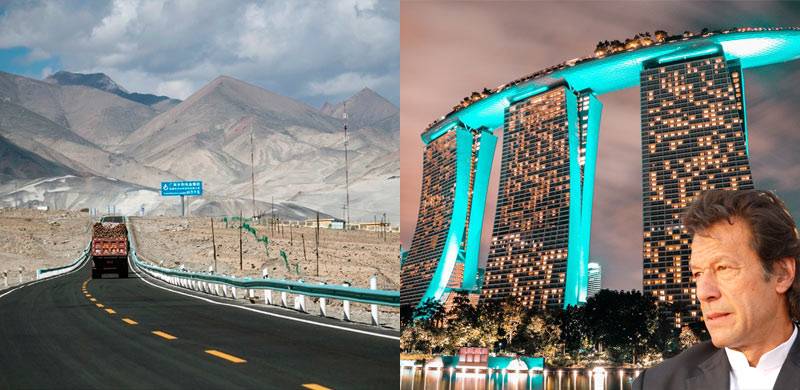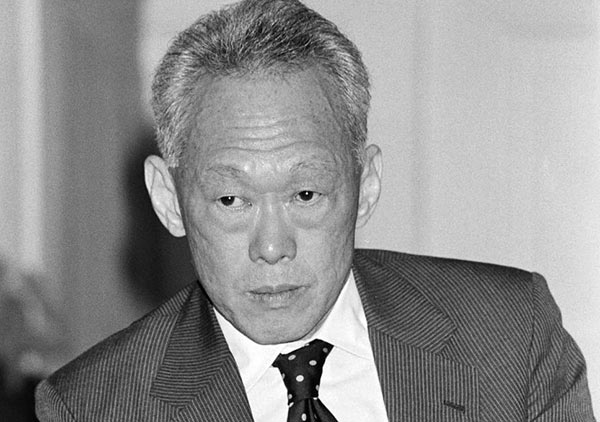
Farrukh Javed Abbasi in this article explains how Pakistani policymakers' misplaced desire for a presidential system and an opposition-less political spectrum is by no means a recipe to success but Singapore's neutral foreign policy, political stability and strong taxation system have already proven their utility.
Singapore became an independent country in 1965 and had a GDP of around 700 million USD. The same year, Pakistan completed its 18 years of independence and had a GDP of 3.7 billion dollars, a technocrat government with fully established presidential system and almost no opposition. Ayub’s cabinet had names like Zulfiqar Ali Bhutto and Sharif Uddin Pirzada for foreign affairs and Muhammad Shoaib for Finance. Mr Shoaib was a globally reputable professional. So at the time Lee Kuan Yew and Singapore started their journey, Ayub Khan and Pakistan already had what Imran Khan and “institutions” are hoping to achieve: a group of excellent professionals, no opposition, a single centre of power and above all, a presidential system.
54 years later, Singapore’s GDP is $320bn while Pakistan’s is $304.95bn.
What did Lee do? Did he eliminate all corrupt politicians from Singapore? Or did he create an unopposed system of government that Ayub Khan already had in place in 1965? Did he eliminate dynastic politics from Singapore? What exactly enabled Singapore to grow by almost 450 times in the last 54 years?
Well, shockingly, Lee Kuan Yew did nothing out of these. Lee Kuan Yew is the longest serving prime minister of history. He contested and won 8 elections consecutively and his son is currently Singapore’s prime minister for the third time. Singapore still has a lot of political dynasties and many of the new leaders of Singapore’s PAP are either children or relatives of Lee Kuan Yew’s party, and yet New York Times had to pay $114,000 in a defamation lawsuit settlement after calling Lee Kuan Yew’s family a political dynasty. This is because Singapore’s electoral system is not influenced by any foreign or local power.

The eight elections that Lee Kuan Yew won, and the three that his son won, were all freely monitored and reported by international and local media. In fact several internationally acclaimed journalists have reported that the elections are by and large free and fair.
Asia editor for The Economist Intelligence Unit recently issued a statement that the patriotic fervour – the trademark electoral campaign strategy of the ruling party – is not working as it did in the past, pointing to a trend of 20% decline in the vote bank of Lee Kuan Yew’s party, which also shows that the electoral process is largely free and fair.
So what did Singapore do over the last 54 years to become the Manhattan and Monte Carlo of East Asia? The key was a neutral foreign policy, which allowed Singapore to work with both China and the US while protecting its own trade interests. Singapore, despite being in proximity with the conflict zone of China and North Korea, did not engage in any form of conflict but focused on increasing its manufacturing exports, and also kept increasing its market share of the services and recreational tourism industry.
It built three magnificent state-run casinos and resorts that created an upward pressure on the quality of hoteling and the workforce compensation. In a few years, Singapore developed a CPEC-like structural agreement with China. Singapore opened its ports and within two decades, became the third busiest and biggest port of the world. Today, it is the second biggest port of the world after Shanghai.
Another reason for Singapore’s success was its tax collection authority IRAS. Last year, it collected $50.2bn which represents 60.2% of the federal government’s operating revenue and about 11.1% of Singapore’s total GDP.
In Pakistan, FBR collected just north of $640mn in taxes which is just 0.0019% of Pakistan’s total GDP. Pakistan’s population is 204 million while Singapore’s population is just around 5 million people. With a population 40 times less than that of Pakistan, Singapore is collecting 78 times more tax.
These numbers indicate that Pakistan’s tax collection potential is around 800bn rupees annually if we improve our taxation system’s capacity.
Singapore has been increasing and decreasing its corporate tax rates over the last 40 years but it has never experienced a reduction in total tax collection year-by-year during the last 37 years which explains why Berkshire Hathaway VS Charlie Munger told CNBC that America should look at Singapore’s model if it wants to improve its economic conditions.
Singapore has also modelled itself to be a global attraction for top talent which is why 17.5% of its population comprises of working immigrants. Singapore’s financial district and stock market have been the epicenter of its growth. It has aggressively competed against Tokyo, Hong Kong, Shanghai and other markets because foreign investor did not have any concerns about political uncertainty.
This brings us back to Pakistan where political uncertainty has had the severest impact on the economic conditions of the country.
Singapore, despite its dynastic politics, has maintained a neutral foreign policy, a proper taxation system, and an investor friendly environment to become a manufacturing, shipping and tourism-based economy.
Pakistan has a lot to learn from Singapore. Its policymakers should learn about the economic theory of Coase theorem which proves that property distribution rights do not matter if markets have extremely low or no transaction costs and in an environment of very low and zero transaction costs, parties naturally move towards an optimal and mutually beneficial outcome.
The system which Pakistan’s current decision makers are trying to adopt was already in place in Pakistan during the Ayub regime with far more competent and professionally recognised cabinet members than the current ones but it did not help the country at all.
Pakistan should learn from Singapore and create its own success story by focusing on reducing the cost of business, increasing personal taxes and creating an environment of political certainty for boosting investor confidence, more trade and a neutral economic policy.
Singapore became an independent country in 1965 and had a GDP of around 700 million USD. The same year, Pakistan completed its 18 years of independence and had a GDP of 3.7 billion dollars, a technocrat government with fully established presidential system and almost no opposition. Ayub’s cabinet had names like Zulfiqar Ali Bhutto and Sharif Uddin Pirzada for foreign affairs and Muhammad Shoaib for Finance. Mr Shoaib was a globally reputable professional. So at the time Lee Kuan Yew and Singapore started their journey, Ayub Khan and Pakistan already had what Imran Khan and “institutions” are hoping to achieve: a group of excellent professionals, no opposition, a single centre of power and above all, a presidential system.
54 years later, Singapore’s GDP is $320bn while Pakistan’s is $304.95bn.
What did Lee do? Did he eliminate all corrupt politicians from Singapore? Or did he create an unopposed system of government that Ayub Khan already had in place in 1965? Did he eliminate dynastic politics from Singapore? What exactly enabled Singapore to grow by almost 450 times in the last 54 years?
Well, shockingly, Lee Kuan Yew did nothing out of these. Lee Kuan Yew is the longest serving prime minister of history. He contested and won 8 elections consecutively and his son is currently Singapore’s prime minister for the third time. Singapore still has a lot of political dynasties and many of the new leaders of Singapore’s PAP are either children or relatives of Lee Kuan Yew’s party, and yet New York Times had to pay $114,000 in a defamation lawsuit settlement after calling Lee Kuan Yew’s family a political dynasty. This is because Singapore’s electoral system is not influenced by any foreign or local power.

The eight elections that Lee Kuan Yew won, and the three that his son won, were all freely monitored and reported by international and local media. In fact several internationally acclaimed journalists have reported that the elections are by and large free and fair.
Asia editor for The Economist Intelligence Unit recently issued a statement that the patriotic fervour – the trademark electoral campaign strategy of the ruling party – is not working as it did in the past, pointing to a trend of 20% decline in the vote bank of Lee Kuan Yew’s party, which also shows that the electoral process is largely free and fair.
So what did Singapore do over the last 54 years to become the Manhattan and Monte Carlo of East Asia? The key was a neutral foreign policy, which allowed Singapore to work with both China and the US while protecting its own trade interests. Singapore, despite being in proximity with the conflict zone of China and North Korea, did not engage in any form of conflict but focused on increasing its manufacturing exports, and also kept increasing its market share of the services and recreational tourism industry.
It built three magnificent state-run casinos and resorts that created an upward pressure on the quality of hoteling and the workforce compensation. In a few years, Singapore developed a CPEC-like structural agreement with China. Singapore opened its ports and within two decades, became the third busiest and biggest port of the world. Today, it is the second biggest port of the world after Shanghai.
Another reason for Singapore’s success was its tax collection authority IRAS. Last year, it collected $50.2bn which represents 60.2% of the federal government’s operating revenue and about 11.1% of Singapore’s total GDP.
In Pakistan, FBR collected just north of $640mn in taxes which is just 0.0019% of Pakistan’s total GDP. Pakistan’s population is 204 million while Singapore’s population is just around 5 million people. With a population 40 times less than that of Pakistan, Singapore is collecting 78 times more tax.
These numbers indicate that Pakistan’s tax collection potential is around 800bn rupees annually if we improve our taxation system’s capacity.
Singapore has been increasing and decreasing its corporate tax rates over the last 40 years but it has never experienced a reduction in total tax collection year-by-year during the last 37 years which explains why Berkshire Hathaway VS Charlie Munger told CNBC that America should look at Singapore’s model if it wants to improve its economic conditions.
Singapore has also modelled itself to be a global attraction for top talent which is why 17.5% of its population comprises of working immigrants. Singapore’s financial district and stock market have been the epicenter of its growth. It has aggressively competed against Tokyo, Hong Kong, Shanghai and other markets because foreign investor did not have any concerns about political uncertainty.
This brings us back to Pakistan where political uncertainty has had the severest impact on the economic conditions of the country.
Singapore, despite its dynastic politics, has maintained a neutral foreign policy, a proper taxation system, and an investor friendly environment to become a manufacturing, shipping and tourism-based economy.
Pakistan has a lot to learn from Singapore. Its policymakers should learn about the economic theory of Coase theorem which proves that property distribution rights do not matter if markets have extremely low or no transaction costs and in an environment of very low and zero transaction costs, parties naturally move towards an optimal and mutually beneficial outcome.
The system which Pakistan’s current decision makers are trying to adopt was already in place in Pakistan during the Ayub regime with far more competent and professionally recognised cabinet members than the current ones but it did not help the country at all.
Pakistan should learn from Singapore and create its own success story by focusing on reducing the cost of business, increasing personal taxes and creating an environment of political certainty for boosting investor confidence, more trade and a neutral economic policy.
